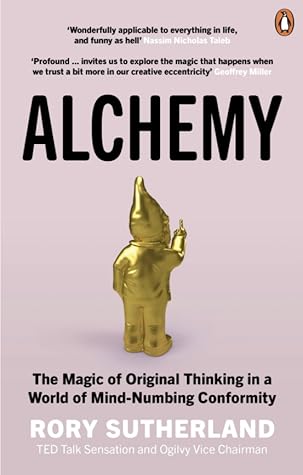More on this book
Community
Kindle Notes & Highlights
The risk of spurious correlations, ephemeral correlations, confounding variables or confirmation bias can lead to more dumb decisions than insightful ones, with the data giving us a confidence in these decisions that is simply not warranted.
Big data makes the assumption that reality maps neatly on to behaviour, but it doesn’t. Context changes everything.
Nature spends a great deal of resources on what might be called ‘perception hacking’ or, in business terminology, marketing.
Economic logic is an attempt to create a psychology-free model of human behaviour based on presumptions of rationality, but it can be a very costly mistake. Not only can a rational approach to pricing be very destructive of perceived savings, but it also assumes that everyone reacts to savings the same way.
‘the focusing illusion’, as he calls it, causes us to vastly overestimate the significance of anything to which our attention is drawn.
neuroscientist Michael Graziano explains, ‘If the wind rustles the grass and you misinterpret it as a lion, no harm done. But if you fail to detect an actual lion, you’re taken out of the gene pool.’
In the photograph of the key, an algorithm picked out a human face from what is merely two dots and a line cut into it. Software suffers from pareidolia too.
What this all means is that no living creature can evolve and survive in the real world by processing information in an objective, measured and proportionate manner. Some degree of bias and illusion is unavoidable.
‘Goldilocks effect’ – the natural human bias that means that, when presented with three options, we are most likely to choose the one in the middle.
When working with IKEA I was once advised: ‘Do not, under any circumstances, suggest ways of making the IKEA experience more convenient. If you do, we shall fire you on the spot.’
Robert Cialdini has observed that, as you are closing a sale, the admission of a downside oddly adds persuasive power: ‘Yes, it is expensive, but you’ll soon find it’s worth it,’ seems to be a strangely persuasive construction
The moral of the fable is that many pretend to despise and belittle that which is beyond their reach. This
The opposite phenomenon to sour grapes is often called ‘sweet lemons’, where we ‘decide’ to put a positive spin on a negative experience.
Shakespeare wrote, ‘there is nothing either good or bad, but thinking makes it so’.
At present the UK Government spends over £25 billion each year on tax rebates for pension contributions, a staggeringly generous incentive to save for retirement by any standards, and yet it is staggeringly ineffective.
loss-aversion, the mental mechanism that causes us to experience more pain from losing £100 than pleasure from winning £100.fn4
Antelope might be able to find slightly better grass by escaping their herd and wandering off on their own, but a lone one would need to spend a large proportion of its time looking out for predators rather than grazing;
As Bill Bernbach observed, conventional logic is hopeless in marketing – as you end up in the same place as your competitors.
Perhaps one of the first rules of interface design is ‘don‘t try to be logical’.
As one shopper told us, “I’m not here to enter into a relationship. I just want to buy something.”
the very people who had baulked at registering before completing the purchase were only too happy to leave their details and create an account at the end of the process. This shows that what mattered was not the actions we asked them to perform, but the order in which they were asked to make them.
most important clues may often seem irrelevant and a lot of life is best understood by observing trivial details.
‘the arithmocracy’ to describe a new class of influential people who believe that their superior level of education qualifies them to make economic and political decisions.
under communism; when a product was advertised there, demand often went down. This was because under communism anything desirable was in short supply, so people inferred that the government would only promote something that was of such hopelessly crappy quality
When he won a MacArthur Foundation fellowship in 1984, Amos Tversky said of his work as a cognitive psychologist, ‘What we do is take what is already instinctively known by used-car salesmen and advertising executives, and we examine them in a scientific way.’
it is not quite fair to excoriate all snake-oil salesmen – in the days before antibiotics, snake oil was quite possibly the best solution available. Genuine snake oil, from the fat of the Chinese water snake, contains 20 per cent eicosapentaenoic acid, which has potent analgesic and anti-inflammatory properties and was used successfully in Chinese medicine for centuries.
John Lennon observed, ‘Time spent doing nothing is rarely wasted’,


